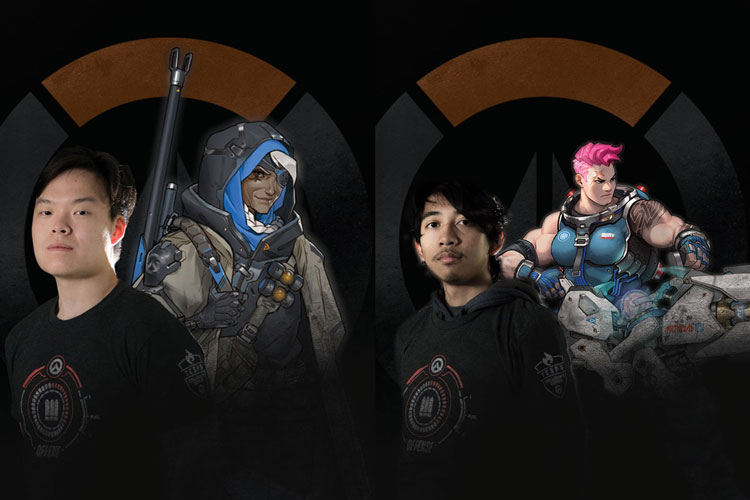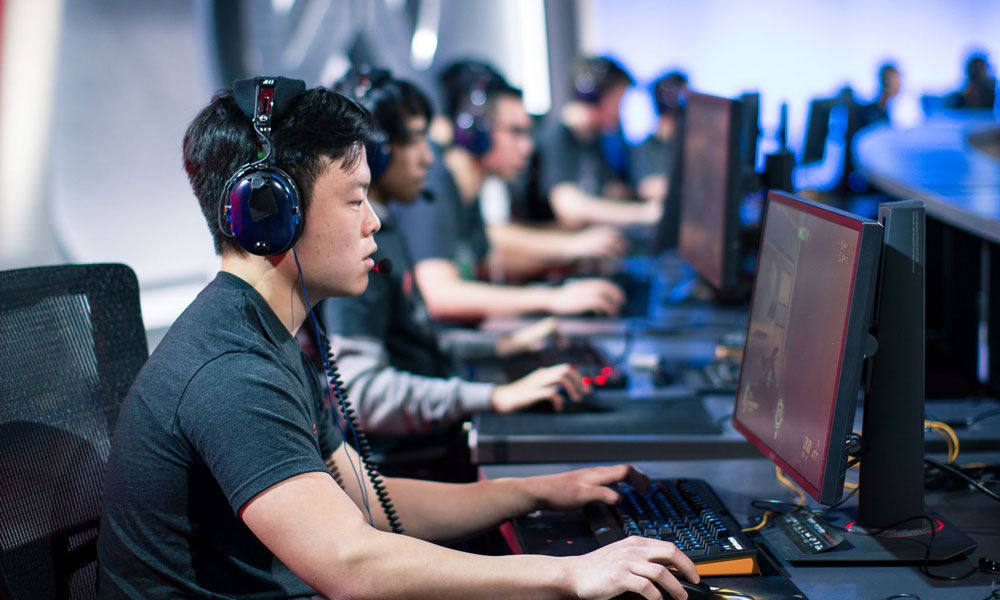Cheers love, the cavalry’s here — at Cal
Campus keeps pace with rise of esports as Overwatch team heads to national championships

February 12, 2018

Like Superman’s mild-mannered alter ego, Clark Kent, UC Berkeley economics junior Daniel Lee blends easily into the crowds as he makes his way to class, or to the gym, or to get ramen with his girlfriend Tiffany – until he gets asked for his autograph.
Under the username “Alined,” Lee is a quasi-celebrity in the fast-paced world of competitive video gaming, also known as esports, which is on track to rival traditional sports in young audiences, franchises and revenues over the next decade.
His realm is Overwatch, a multiplayer first-person shooter video game about an international team of “heroes” recruited to defeat a rogue AI robot rebellion, who then battle each other.
The game’s diverse lineup includes the openly gay character Tracer, who famously calls out “Cheers love, the cavalry’s here” whenever she arrives on the scene.
With millennials and teens packing arenas or watching live-streamed competitive video games at home, it’s an understatement to say that esports is coming of age.
“The stigma of gamers playing alone on old couches in basements is over,” says Lawrence Zhao, a freshman in engineering and business who covers esports for the Daily Californian student newspaper. “Esports are social and highly competitive. Kids are not growing up idolizing Michael Jordan. They’re idolizing Overwatch or CounterStrike players.”
To keep pace with the rise of esports at college campuses around the nation, UC Berkeley’s Recreational Sports program is seeking a community space to provide, among other things, a practice room for Cal gaming teams competing in Overwatch, League of Legends, Dota 2, Starcraft II and other popular titles.
Headed to national championships
Lee, 20, briefly played professionally before becoming a founding member of the Cal Overwatch team in 2016. As far as avatars go, he likes to play Mei, an upbeat climate scientist who uses extreme weather to wall off enemies and protect the environment: “Mei is jolly, independent and chill, like me,” he quips.
This coming weekend, the Cal Overwatch Team, which Lee captains, is headed to Tempe, Arizona, to defend its national collegiate champion title against the University of Toronto, UC Irvine and UC San Diego.
Co-sponsored by Tespa, a network that connects college gamers around the nation, the Fiesta Bowl event will be livestreamed to tens of millions of viewers via the Twitch channel.
Joining Lee at the Arizona State University arena will be his teammates: Kevin “SlurpeeThief” Royston, Gandira “Syeikh” Prahandika, Alexander “PaiGwut” Dam, Andrew “Quantum” Huang and Isaias “izzyyyb” Barrera. Their coach is Kyle Feng, who was captain of the Cal Overwatch team last year.
Like most gamers, the six-member Cal Overwatch crew is young and male. Conversations are peppered with jargon like “salty” (upset), “grinding” (repeating tasks for gameplay advantage), “DPS” (damage per second) and “toxic” (angry players).
Victories notwithstanding, they’ve bonded over some humiliating losses: “We want to win, and the only way we can win is by working together as a team,” says Barrera, 21, a senior in engineering who joined the Cal Overwatch crew last fall, and thinks of himself as the team’s peacemaker.
Overwatch was launched by Blizzard Entertainment in 2016, and has an estimated 35 million players worldwide. Its 26-plus heroes must carry out missions across volatile battlefields known as “maps.” The roster is roughly divided into offensive players known as “damage dealers,” “tanks” who act as buffers to protect the team and “healers” who use their powers to cure damage. There are also flex players who can change roles.
“It’s a brain game like chess, but it’s also a sport like ice hockey because you can switch your composition during the game. You don’t have to wait for a timeout,” says Barrera, who plays soccer. “Plus, you have to train to have the mental fortitude to play a 90-minute series of three games.”
Barrera and his teammates tout Overwatch for being more upbeat and diverse than the dark, dystopian, good-guy-vs.-bad-guy first-person shooter games: “You really connect with the different personalities in the game,” says Barrera, who likes to play the hero Zenyatta, a healer whose medicine chest includes orbs of harmony and discord.
“Players are more fluid. They don’t want to be put in boxes. But they like battles and they like to win,” says Dam, 21, a senior in political science, and the newest member on the team. He identifies with Lucio, a support hero whose songs can heal his allies or speed them up.
As a team, they practice six hours a week and individually, two to four hours a day. If the team wins a varsity championship, they can earn around $7,000 apiece in scholarship money.
Whether they’re playing remotely or in the same physical space, players communicate via wireless headsets. With so many protagonists and scenarios in play, they have to be calculating and, at the same time, make a lot of decisions on the fly.
“It’s not a physical sport in the traditional sense, but you have to have muscle memory to make precise movements, and to move the mouse to the correct pixel on the screen,” says team member Huang, 19, a sophomore in computer science. “You have to play it a lot to get game sense, and once you have game sense, you can predict when someone’s going to attack.”
As with physical team sports, tempers flare when a player messes up badly. “Just like you get bullied in a pickup basketball game or soccer game, you get called out in Overwatch for being bad at the game,” Barrera says.
Some players get pushback from family members who would rather they spend their time studying than playing video games.
Take Lee, who hails from South Korea, where throngs of gamers gather at cafes known as “PC Bangs” to play on state-of-the-art equipment. Even though he ranks among the top 100 Overwatch players in North America he keeps tightlipped about his gamer life around his family.
The same goes for Prahandika, 21, an Indonesian senior in cognitive science who likes to play Junkrat, a pyromaniacal defense player who bounces around and lobs grenades: “My mom’s mad at me for playing. She wants me to study more,” he says.
Campus esports gets its due
Last year, the Cal Overwatch team defeated Rutgers, the University of Texas and the University of Toronto to win the Tespa national collegiate series, taking home $42,000 between them in scholarship money.
That and other victories by Cal’s Dota 2 and Starcraft II teams – as well as growing membership in campus gaming clubs under eSports@Berkeley – spurred Recreational Sports to make esports an official part of its program in March 2017.
Right now, nine competitive teams make up the official Cal eSports program, including League of Legends, Hearthstone, Counter-Strike: Global Offensive, and Heroes of the Storm, and there are plans to add at least two more.
Not surprisingly, the program faces its share of skeptics who scoff at the notion of video gaming joining the pantheon of athletic activities at UC Berkeley. Bad behavior among professional gamers – such as the suspension of Felix Lengyel, an Overwatch League player for the Dallas Fuel, for making a homophobic slur on his personal live stream – don’t help.
But collegiate gamers and their advocates counter that esports deserves the same respect as other competitive activities on campus. Its mass appeal among middle schoolers and high schoolers, arguably future generations of college students, means it’s here to stay.
“Esports will never replace traditional sports, but it will be one of many sports,” predicts Tiffany Tsay, coordinator of the Cal Overwatch team.
Tsay, a junior in statistics, grew up in Palo Alto playing video games with her older brother, but didn’t “come out” as a gamer until she got to UC Berkeley and joined campus esports clubs.
As a young woman entrenched in the gaming community, she sees the gender gap up close. “At tryouts, you’ll have 50 guys and three girls so, statistically, it’s just harder to get female players on the team,” she laments.

Tsay oversaw the Cal Overwatch tryouts when Lee came on the scene in 2016, and was thrilled at the prospect of having a nationally ranked player in the group. But her excitement quickly turned to annoyance.
“He was being a complete troll, not really taking it seriously even though he had the highest skill ranking,” she recalls. “He goofed off the entire trial.”

Tracer (Overwatch photos courtesy of Blizzard Entertainment)
“I didn’t want to sandbag the trials,” Lee explains. “I wanted to make them fun for the other players.”
But Tsay wasn’t amused, “He didn’t get back to us for two days,” she says. “He still hates coming to meetings.”
Still, she agreed to go on a date with him, and now they’re celebrating their one-year anniversary.
“This is a story about how I’m the esports nerd who found this beautiful woman,” Lee teases.
Tsay would prefer a story announcing the Overwatch team’s second national championship.
“When they succeed, you feel like, ‘Yesss, we did it,’” she says.
Lee isn’t stressed: “Cheers love, the cavalry’s here,” he chants.
SEE ALSO: